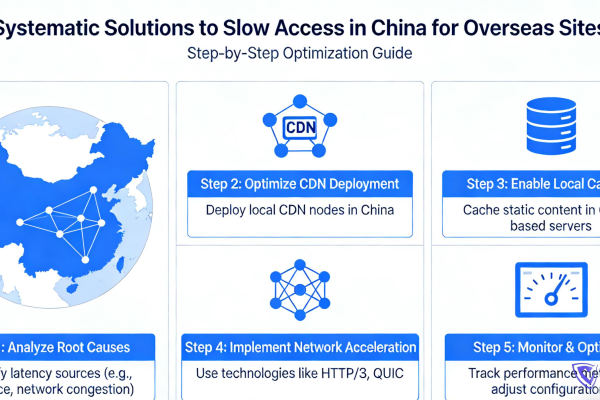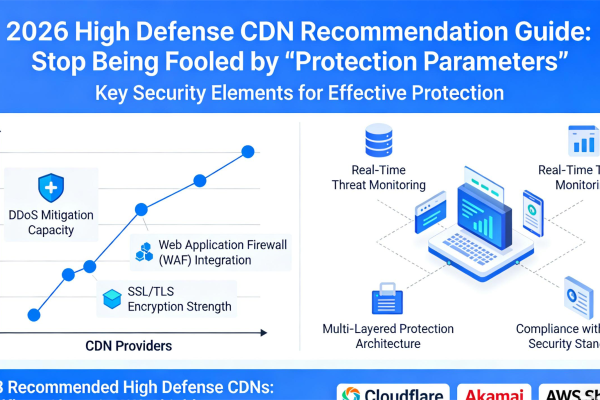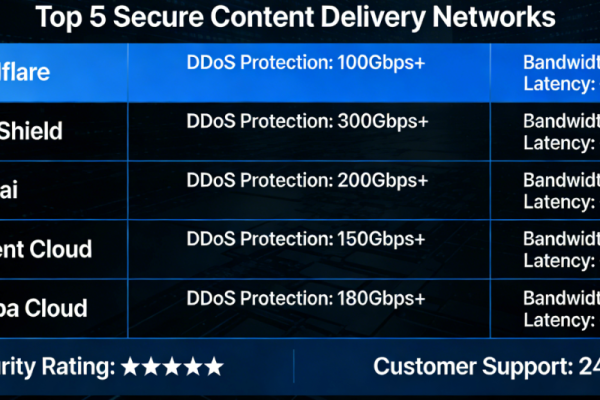Overseas CDN Providers Without ICP Filing: Which Ones Offer Both DDoS Protection and High Speed?
Top Overseas No-Filing CDN Providers: Curated Acceleration Solutions for Foreign-Based Websites Accessible in Mainland China – Stable Performance, Robust Defense, No ICP Filing Needed & High-Anti DDoS Node Integration.

There's a saying among website owners:
"With servers overseas, accessing from China feels like the dial-up days."
Many people build foreign trade sites, content communities, independent blogs, or even landing pages for overseas applications, hosting their origin servers in places like the United States, Japan, or Singapore.
The reason is simple – they want to avoid the hassle of ICP filing and fewer restrictions.
But here's the problem: although the website is online, users in China find it painfully slow to open, sometimes even inaccessible.
This is where an "Overseas CDN without ICP filing" becomes a lifesaver.
It allows access from China to overseas servers to be fast, stable, and attack-resistant, all without requiring an ICP filing.
But the catch is – you must choose the right provider and the right network routes.
I. Why Do Many People Host Their Origin Servers Abroad?
- ICP Filing is Too Cumbersome
The MIIT filing process is manageable for individuals but too time-consuming for foreign trade, content-based sites, or small teams.
If the filing isn't approved, the domain faces suspension of resolution. - Greater Content Freedom
Hosting abroad means more flexibility with content, avoiding blocks due to keywords, comments, or links. - More Controllable Costs
Overseas servers (especially VPS, cloud hosts) are highly competitive, often cheaper than domestic options.
Many support monthly payments and cryptocurrency, avoiding real-name verification or freezing issues. - Convenient for Cross-Border Business
If you're in cross-border e-commerce, gaming, tool websites, or global products, hosting abroad helps reach the global market faster.
But the trade-off for these benefits is: Access speed and stability from China take a significant hit.
This is precisely where a "No-Filing CDN" comes into play.

II. Why is Access from China to Overseas Sites Slow?
The essence of network latency is "Distance + Transit + Blocking".
- Accessing overseas sites from mainland China requires passing through multiple cross-border backbone gateways;
- Each hop can introduce packet loss, latency, or even blocking;
- Some nodes are blocked due to anti-attack measures, causing detours that make access feel like "taking the scenic route".
Especially when the origin server is in the US or Europe, latency for many standard broadband connections exceeds 300ms,
Coupled with DNS pollution or international gateway congestion, web pages often fail to load.
So, if you want visitors from China to access your site reliably, you need an "intermediate protective layer" –
an Overseas CDN without ICP filing.
III. How Does a No-Filing CDN Solve This Problem?
Simply put: It acts as a "transit accelerator".
CDN providers deploy nodes in transit regions like Hong Kong, Japan, Singapore, Taiwan,
These nodes are close to China's networks, have sufficient bandwidth, and optimized routes.
When a user in China visits your site:
- The request first goes to the nearest CDN node (e.g., Hong Kong);
- The node checks if the content is cached;
- If yes, it serves the content directly;
- If not, it fetches it from the origin server (e.g., the US).
This is like building an "acceleration bridge" between the "Overseas Origin Server" and "Chinese Users".
So instead of a trip around the world, access now just takes a couple of hops.
The result is – faster speed, less packet loss, and much greater stability.
IV. The Real Value of a No-Filing CDN (More Than Just Speed)
- Optimizes Access Speed from China
Good overseas CDNs implement "intelligent routing" for Chinese ISPs (China Telecom, Unicom, Mobile).
Simply put, they automatically assign the fastest route based on the user's region, e.g., Southern China via Hong Kong, Northern China via Japan. - Strong DDoS Protection
Once an overseas origin server's IP is discovered, it's vulnerable to DDoS attacks.
CDN nodes hide the origin IP, absorbing attacks on the CDN infrastructure, which is handled by the provider's defenses. - High Stability, Origin Server Blocking Avoided
CDN nodes can switch IPs and entry points; if one node is blocked, the system automatically reroutes traffic. - No Filing, No Real-Name Verification, Instant Setup
For small and medium site owners, this is a huge advantage.
No reporting, no ID submission – purchase and use immediately.

V. Which Websites Are Suitable for a No-Filing CDN?
- 🌍 Overseas Origin + Many Chinese Visitors
Foreign trade content sites, blogs, news sites, media/video sites, communities, software download sites, etc. - 💼 Cross-Border Business Landing Pages
e.g., Your primary market is Southeast Asia, but you need Chinese partners to access the official site normally. - 🛒 Independent Store Sellers
Shopify or WooCommerce stores with origin servers abroad, but needing smooth page loads for buyers in China. - 💬 SaaS Tool Products
Origin on AWS, GCP, or other overseas clouds, but user base in China; a CDN significantly improves response times.
VI. Recommended Overseas No-Filing CDN Providers to Watch in 2025
1️⃣ CDN07
- Focus: Specializes in High-Defense CDN for the Asia-Pacific region
- Node Locations: Hong Kong, Japan, Singapore, Taiwan, US West Coast
- Advantages: No ICP filing, no real-name verification, supports USDT payment; excellent optimized routes for China access
- Features: Strong attack resistance, fast DNS resolution, responsive support
- Ideal For: Foreign trade sites, content-based sites, small/medium projects with origins abroad
- Highlight: Cost-effective, specifically designed for "Overseas Origin → China Access"
2️⃣ Cloudflare
- Focus: Globally distributed CDN provider
- Advantages: 300+ global nodes, built-in WAF & defense mechanisms
- Drawbacks: Access speed from mainland China can be average; better suited for international trade or English content sites
- Features: Free tier available, but Pro plan recommended for faster edge nodes
- Ideal For: Low-traffic websites, content delivery, foreign trade promotion pages
3️⃣ Bunny.net
- Focus: Cost-effective overseas acceleration service
- Node Distribution: 60+ countries globally
- Advantages: Affordable pricing, low latency, user-friendly interface
- Drawbacks: No dedicated China-optimized routes; needs pairing with Hong Kong transit nodes
- Ideal For: Personal blogs, tool websites, resource download sites
4️⃣ Gcore
- Focus: High-performance CDN originating from Europe
- Advantages: Stable, secure, strong DDoS resistance
- Features: API integration, well-developed optimizations for gaming & video
- Drawbacks: Node coverage in Asia-Pacific is not as dense
- Ideal For: Multimedia or video sites with origins in Europe/US
5️⃣ Akamai (Enterprise Focus)
- Focus: Top-tier enterprise CDN brand
- Advantages: Global coverage, extremely high reliability, top-class attack protection
- Drawbacks: High cost, suitable for large enterprises or app acceleration
- Ideal For: Financial-grade applications, large global enterprises
VII. Practical Tips for Choosing a No-Filing CDN
- Prioritize providers with "Hong Kong + Asian transit nodes"
The lowest latency path from China is: Mainland → Hong Kong/Japan → Origin.
So node layout is a key metric. - Test access speeds from different ISPs
Access experience varies greatly by province and broadband provider.
Use tools likeping.pe,17ce.comto test CDN performance. - Ensure Origin IP Masking
If the CDN doesn't hide your origin server IP, your site is vulnerable to direct attacks. - Pay Attention to DNS Stability
Many overlook DNS, but slow CDN resolution severely impacts initial page load times. - Understand Compliance Boundaries
If your site solely targets users in mainland China, assess ICP filing risks.
But if it's primarily for overseas users with some Chinese access, it falls within reasonable use.
In a nutshell:
Skipping filing isn't about cutting corners; it's about ensuring overseas websites are accessible to users in China.
Choosing the right CDN is like building a dedicated highway between overseas servers and Chinese users.
Choosing wrong is like taking a country road – not only slow but also prone to blocking.
The real keys are:
- Nodes must be close (Hong Kong/Singapore);
- Defense must be strong (High-defense nodes);
- Service must be stable (Reliable support).
This niche market is maturing rapidly in 2025,
Providers like CDN07 specifically address the long-standing pain point of "Overseas Origin → China Access".
Share this post:
Related Posts

A Systematic Approach to Fixing Slow China Access for Overseas Websites
If your overseas site loads slowly in China, the problem usually isn't your server. This guide expla...

The 2026 Guide to DDoS-Protected CDNs: Don't Get Blinded by the Numbers
Looking at specs alone is a trap. This guide breaks down how to choose a DDoS-protected CDN in 2026...

Hong Kong High-Defense CDN Recommendations (2026 Latest Edition)
Not all Hong Kong high-defense CDNs can withstand attacks. This article compares the protection stre...
